-
 Bitcoin
Bitcoin $85,116.5880
-4.13% -
 Ethereum
Ethereum $2,315.9027
-6.90% -
 Tether USDt
Tether USDt $0.9990
0.03% -
 XRP
XRP $2.1842
-5.32% -
 BNB
BNB $611.4012
-2.50% -
 Solana
Solana $137.8915
-3.38% -
 USDC
USDC $0.9999
0.01% -
 Dogecoin
Dogecoin $0.2052
-3.40% -
 Cardano
Cardano $0.6551
-5.03% -
 TRON
TRON $0.2272
-0.86% -
 Chainlink
Chainlink $15.1868
-1.55% -
 Litecoin
Litecoin $122.4656
2.61% -
 Avalanche
Avalanche $22.2937
0.66% -
 Sui
Sui $2.9087
-4.50% -
 Stellar
Stellar $0.2865
-3.04% -
 Toncoin
Toncoin $3.4626
-3.64% -
 Shiba Inu
Shiba Inu $0.0...01437
0.25% -
 UNUS SED LEO
UNUS SED LEO $9.0583
0.11% -
 Hedera
Hedera $0.1972
-0.02% -
 Polkadot
Polkadot $4.8336
1.95% -
 MANTRA
MANTRA $7.2498
-5.08% -
 Hyperliquid
Hyperliquid $20.1457
-2.66% -
 Ethena USDe
Ethena USDe $0.9989
-0.01% -
 Bitcoin Cash
Bitcoin Cash $294.8364
-0.68% -
 Dai
Dai $0.9999
0.02% -
 Uniswap
Uniswap $7.9886
-4.73% -
 Bitget Token
Bitget Token $3.9143
-10.81% -
 Monero
Monero $214.4466
-1.65% -
 NEAR Protocol
NEAR Protocol $3.0444
-0.91% -
 Aptos
Aptos $6.1334
8.88%
How volatility is Bitcoin ETF?
Bitcoin ETFs inherit Bitcoin's volatility, driven by regulatory uncertainty, market sentiment, technological advancements, and macroeconomic conditions; understanding these factors is crucial before investing.
Feb 27, 2025 at 06:43 am
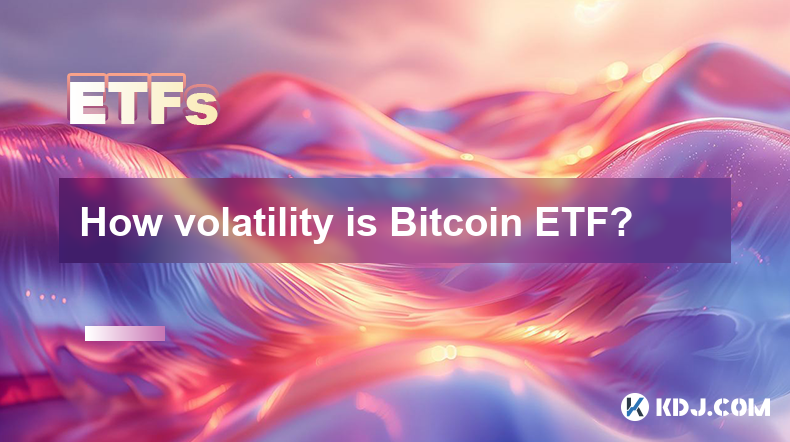
How Volatile is a Bitcoin ETF? Understanding the Risks and Rewards
Key Points:
- Bitcoin's inherent volatility: Bitcoin ETFs track Bitcoin's price, inheriting its inherent volatility. This volatility stems from factors like regulatory uncertainty, market sentiment, technological developments, and macroeconomic conditions. We will delve into each of these factors to illustrate the complex interplay influencing Bitcoin's price fluctuations and, consequently, the volatility of a Bitcoin ETF.
- ETF structure and its impact on volatility: The structure of a Bitcoin ETF, including its underlying assets, investment strategy, and expense ratio, can influence its volatility relative to Bitcoin itself. We will examine different ETF structures and how they might mitigate or amplify volatility.
- Comparing Bitcoin ETF volatility to other asset classes: Understanding the volatility of a Bitcoin ETF requires comparing it to other asset classes, such as stocks, bonds, and other commodities. This comparison provides context and helps investors assess the risk profile of Bitcoin ETFs within a diversified portfolio.
- Factors influencing Bitcoin ETF volatility: We will analyze specific events and trends that have historically impacted Bitcoin's price and, therefore, the volatility of Bitcoin ETFs. These include regulatory announcements, macroeconomic events, and technological upgrades or setbacks.
Unordered List of Detailed Explanations:
- Bitcoin's Inherent Volatility and its Drivers:
Bitcoin's price has historically exhibited significant volatility. This inherent volatility is a key characteristic that investors must understand before considering a Bitcoin ETF. Several factors contribute to this price fluctuation:
* **Regulatory Uncertainty:** Government regulations surrounding Bitcoin and cryptocurrencies in general are constantly evolving. Changes in regulatory frameworks, whether positive or negative, can significantly impact investor sentiment and market price. For instance, a country banning cryptocurrency trading could lead to a sudden price drop, whereas a supportive regulatory environment could drive prices up. The uncertainty itself, even without concrete policy changes, contributes to volatility as investors speculate about future regulatory outcomes. This uncertainty often manifests as sharp price swings based on news and rumors about potential regulations. The lack of a globally unified regulatory approach exacerbates this issue, as differing regulations across jurisdictions create unpredictable market dynamics. Moreover, the regulatory landscape is often subject to political influence, adding another layer of unpredictability. Therefore, understanding the regulatory landscape and its potential impact is crucial for assessing the volatility of a Bitcoin ETF.
* **Market Sentiment:** Like any asset, Bitcoin's price is heavily influenced by market sentiment. Positive news, such as adoption by large institutions or successful technological upgrades, tends to boost investor confidence and drive prices higher. Conversely, negative news, such as security breaches or regulatory crackdowns, can lead to sell-offs and price declines. This sentiment can be amplified by social media trends and news cycles, creating rapid price swings based on speculative narratives rather than fundamental analysis. The emotional aspect of market participation plays a significant role, with fear and greed often driving short-term price movements. Understanding these psychological factors is crucial for comprehending Bitcoin's volatility. This is particularly relevant for Bitcoin ETFs, as their price directly reflects the prevailing market sentiment towards Bitcoin.
* **Technological Developments:** Bitcoin's underlying technology is constantly evolving. Successful upgrades and improvements to the Bitcoin network can boost investor confidence and lead to price increases. Conversely, technological setbacks, such as significant network vulnerabilities or scaling issues, can trigger price declines. The development and implementation of new technologies, such as the Lightning Network, can influence the efficiency and scalability of Bitcoin transactions, potentially impacting its long-term value and, consequently, the price of a Bitcoin ETF. These technological factors introduce an element of risk and uncertainty that contributes to volatility. The pace of innovation and the potential for unforeseen technical challenges contribute to the inherent volatility of Bitcoin and its derivative products, such as ETFs.
* **Macroeconomic Conditions:** Global macroeconomic factors, such as inflation, interest rates, and economic growth, can significantly influence Bitcoin's price. During periods of high inflation or economic uncertainty, Bitcoin may be seen as a hedge against inflation or a safe haven asset, leading to price increases. Conversely, during periods of economic stability or rising interest rates, investors might shift their investments towards more traditional assets, leading to price declines. These macroeconomic factors are often beyond the control of individual investors, creating external pressures that affect Bitcoin's price and, consequently, the volatility of a Bitcoin ETF. Understanding the interplay between macroeconomic conditions and Bitcoin's price is crucial for effective risk management.
- ETF Structure and its Impact on Volatility:
The structure of a Bitcoin ETF plays a crucial role in determining its volatility. Different ETFs might employ various strategies, which can either amplify or mitigate the inherent volatility of Bitcoin:
* **Underlying Assets:** The assets underlying a Bitcoin ETF directly influence its volatility. Some ETFs may hold physical Bitcoin, while others might use Bitcoin futures contracts or other derivatives. Holding physical Bitcoin generally leads to greater exposure to Bitcoin's price fluctuations. Futures contracts, on the other hand, offer a degree of leverage, which can amplify both gains and losses. The choice of underlying assets significantly impacts the risk profile of the ETF. Understanding the composition of the underlying assets is crucial for assessing the volatility of a particular ETF. For instance, an ETF using futures contracts might exhibit higher volatility than one holding physical Bitcoin, due to the inherent leverage in futures trading.
* **Investment Strategy:** The investment strategy employed by an ETF can significantly impact its volatility. Some ETFs might use hedging strategies to mitigate risk and reduce volatility. Others might take more aggressive positions, potentially increasing volatility. The ETF's investment mandate will determine the level of risk it takes, and this directly affects the volatility experienced by investors. A conservative investment strategy might prioritize capital preservation, leading to lower volatility, whereas a more aggressive strategy might aim for higher returns, potentially at the cost of increased volatility. Understanding the ETF's investment strategy is crucial for aligning the investment with an investor's risk tolerance.
* **Expense Ratio:** The expense ratio, which represents the annual cost of managing the ETF, doesn't directly impact volatility. However, it indirectly influences returns. Higher expense ratios reduce the net returns, making the overall investment less attractive. While not directly impacting volatility, it affects the risk-adjusted returns, making it a crucial factor to consider when comparing different ETFs. Investors should carefully compare expense ratios to identify cost-effective options within their desired risk profile.
- Comparing Bitcoin ETF Volatility to Other Asset Classes:
To accurately assess the volatility of a Bitcoin ETF, it's essential to compare it to other asset classes:
* **Stocks:** Bitcoin's volatility is generally higher than that of most individual stocks or broad stock market indices. While individual stocks can experience significant price swings, the overall market tends to exhibit less volatility than Bitcoin. This is partly due to the relatively young age and smaller market capitalization of Bitcoin compared to established stock markets. Diversification across asset classes can help mitigate the risk associated with Bitcoin's volatility.
* **Bonds:** Bonds are typically considered less volatile than Bitcoin. They offer a fixed income stream and are generally considered safer investments. However, bond prices can fluctuate in response to changes in interest rates and economic conditions. The contrast between the volatility of Bitcoin and bonds highlights the different risk profiles of these asset classes.
* **Commodities:** Bitcoin can be compared to other commodities, such as gold or oil. While some commodities exhibit significant volatility, Bitcoin's volatility is often higher due to its relatively small market size and susceptibility to speculative trading. Understanding the relative volatility of Bitcoin compared to other commodities helps investors assess its risk profile within a broader portfolio context. The comparison provides a framework for evaluating the risk-return trade-off associated with investing in Bitcoin.
- Factors Influencing Bitcoin ETF Volatility (Specific Events and Trends):
Several specific events and trends have historically impacted Bitcoin's price and, consequently, the volatility of Bitcoin ETFs:
* **Regulatory Announcements:** Major regulatory announcements, such as the approval or rejection of Bitcoin ETFs by regulatory bodies, have historically triggered significant price movements. Positive news often leads to price increases, while negative news can cause sharp declines. The anticipation of regulatory decisions also contributes to volatility, as investors speculate about potential outcomes.
* **Macroeconomic Events:** Major macroeconomic events, such as recessions, geopolitical instability, or changes in monetary policy, can significantly influence Bitcoin's price. During times of economic uncertainty, Bitcoin might be perceived as a safe haven asset, leading to price increases. Conversely, during periods of economic stability, investors might shift their investments to more traditional assets, leading to price declines.
* **Technological Upgrades or Setbacks:** Significant technological upgrades to the Bitcoin network, such as the implementation of new scaling solutions, can positively impact investor sentiment and lead to price increases. Conversely, technological setbacks, such as security breaches or significant network vulnerabilities, can trigger price declines. The continuous evolution of Bitcoin's technology introduces an element of uncertainty that contributes to its volatility.
FAQs:
Q: How does the volatility of a Bitcoin ETF compare to that of a traditional stock market index like the S&P 500?
A: Bitcoin ETFs generally exhibit significantly higher volatility than traditional stock market indices like the S&P 500. The S&P 500 represents a diversified basket of large-cap US stocks, which tends to exhibit smoother price movements over time. Bitcoin, on the other hand, is a relatively new and volatile asset, susceptible to significant price swings based on market sentiment, regulatory changes, and technological developments. Therefore, investing in a Bitcoin ETF involves a substantially higher level of risk compared to investing in a traditional stock market index.
Q: Are there any strategies to mitigate the risk associated with the volatility of a Bitcoin ETF?
A: Yes, several strategies can help mitigate the risk associated with the volatility of a Bitcoin ETF. These include diversification across asset classes (including stocks, bonds, and other commodities), dollar-cost averaging (investing a fixed amount at regular intervals), and setting stop-loss orders (automatically selling the ETF if the price drops below a certain level). Furthermore, carefully selecting a Bitcoin ETF with a lower expense ratio and a well-defined investment strategy can help manage risk. It's crucial to remember that no strategy can completely eliminate the risk associated with Bitcoin's volatility, but these measures can help manage it effectively.
Q: What factors should I consider before investing in a Bitcoin ETF?
A: Before investing in a Bitcoin ETF, you should carefully consider several factors, including your risk tolerance, investment goals, and understanding of Bitcoin's inherent volatility. It's essential to conduct thorough research on the specific ETF you are considering, including its underlying assets, investment strategy, expense ratio, and past performance. Consulting with a financial advisor can provide personalized guidance based on your individual circumstances and risk profile. Remember that investing in Bitcoin ETFs involves significant risk, and you could lose some or all of your investment.
Q: What are the potential benefits of investing in a Bitcoin ETF despite its volatility?
A: Despite its volatility, investing in a Bitcoin ETF offers potential benefits, including exposure to the growth potential of Bitcoin. Bitcoin has demonstrated significant price appreciation since its inception, although this has been accompanied by substantial volatility. For investors with a high-risk tolerance and a long-term investment horizon, Bitcoin ETFs can provide a way to participate in the potential growth of this asset class. It is crucial to remember that past performance is not indicative of future results, and investing in Bitcoin carries substantial risk. The potential benefits must be weighed against the significant risks involved.
Disclaimer:info@kdj.com
The information provided is not trading advice. kdj.com does not assume any responsibility for any investments made based on the information provided in this article. Cryptocurrencies are highly volatile and it is highly recommended that you invest with caution after thorough research!
If you believe that the content used on this website infringes your copyright, please contact us immediately (info@kdj.com) and we will delete it promptly.
- Bitcoin price drops to lows not seen since Nov. 11, 2024
- 2025-02-27 12:55:31
- Bitcoin (BTC) Price Drops Below $90K, Experiencing Its Biggest Price Drop
- 2025-02-27 12:55:31
- Bitcoin and Ethereum Are Losing Momentum—Where's the Next Big Move?
- 2025-02-27 12:50:31
- Crypto ATM Fraud Prevention Act aims to crack down on Bitcoin ATM scams targeting seniors
- 2025-02-27 12:50:31
- MicroStrategy CEO Michael Saylor Calls on Jeff Bezos to Use Bitcoin
- 2025-02-27 12:45:32
- Nvidia (NVDA) stock price target raised to $175 as Q4 results beat estimates
- 2025-02-27 12:45:32
Related knowledge
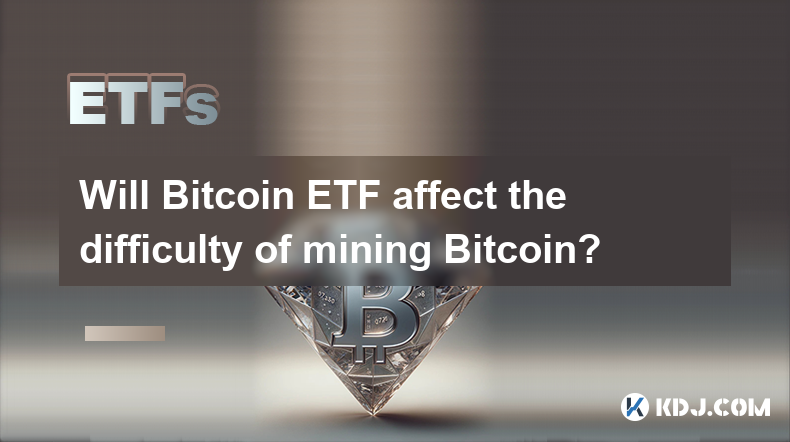
Will Bitcoin ETF affect the difficulty of mining Bitcoin?
Feb 27,2025 at 11:24am
Will Bitcoin ETF Affect the Difficulty of Mining Bitcoin?Key Points:An approved Bitcoin ETF (Exchange-Traded Fund) is likely to increase the demand for Bitcoin, potentially driving up its price.Increased Bitcoin price doesn't directly affect the Bitcoin mining difficulty algorithm.However, a higher price can indirectly influence mining difficulty throug...
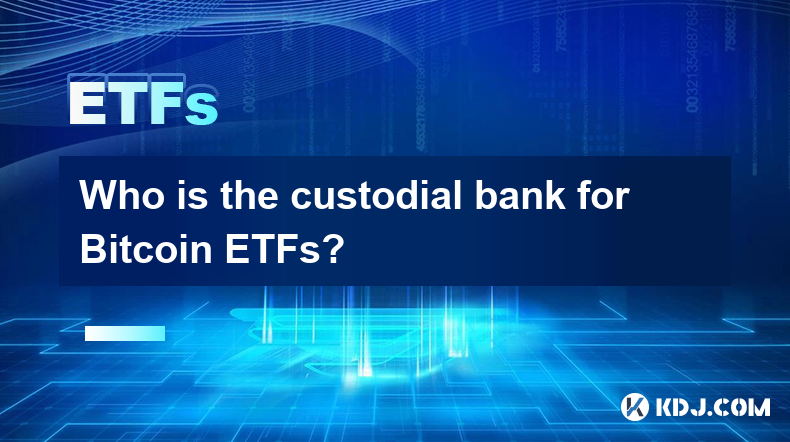
Who is the custodial bank for Bitcoin ETFs?
Feb 27,2025 at 05:12am
Who is the Custodial Bank for Bitcoin ETFs? A Deep Dive into Custody Solutions for Crypto Exchange-Traded FundsKey Points:The role of a custodial bank in a Bitcoin ETF is crucial for ensuring the security and integrity of the underlying Bitcoin assets. They act as a trusted intermediary, safeguarding the Bitcoin held on behalf of ETF investors.Several f...
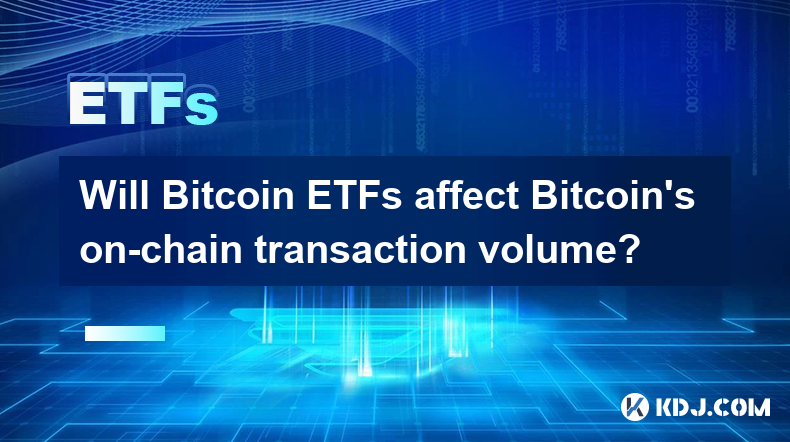
Will Bitcoin ETFs affect Bitcoin’s on-chain transaction volume?
Feb 27,2025 at 02:24am
Will Bitcoin ETFs Affect Bitcoin’s On-Chain Transaction Volume?Key Points:The approval of Bitcoin ETFs could significantly increase institutional investment in Bitcoin, potentially leading to higher on-chain transaction volume. This is because institutional investors often utilize on-chain transactions for various purposes, unlike retail investors who m...
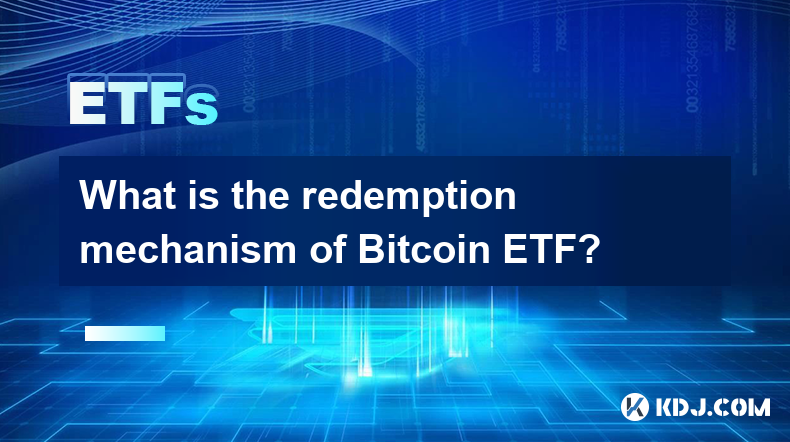
What is the redemption mechanism of Bitcoin ETF?
Feb 27,2025 at 04:06am
What is the Redemption Mechanism of a Bitcoin ETF? A Deep DiveKey Points:Understanding the Structure of a Bitcoin ETF: Bitcoin ETFs, unlike traditional ETFs, face unique challenges due to the inherent nature of Bitcoin as a decentralized, non-custodial asset. The redemption mechanism must address the complexities of physically acquiring and holding Bitc...
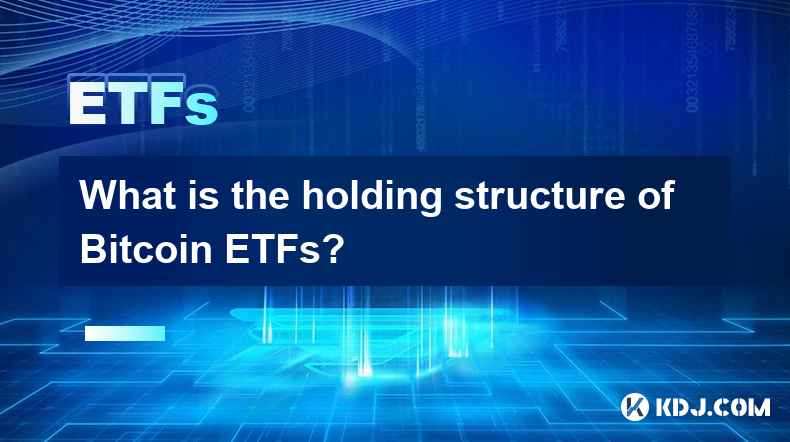
What is the holding structure of Bitcoin ETFs?
Feb 26,2025 at 07:42pm
What is the Holding Structure of Bitcoin ETFs?Key Points:Bitcoin ETFs, unlike traditional ETFs, hold Bitcoin indirectly through various mechanisms. Direct ownership of Bitcoin is often impractical due to regulatory hurdles and operational complexities.The precise holding structure varies significantly depending on the ETF's investment strategy, the juri...
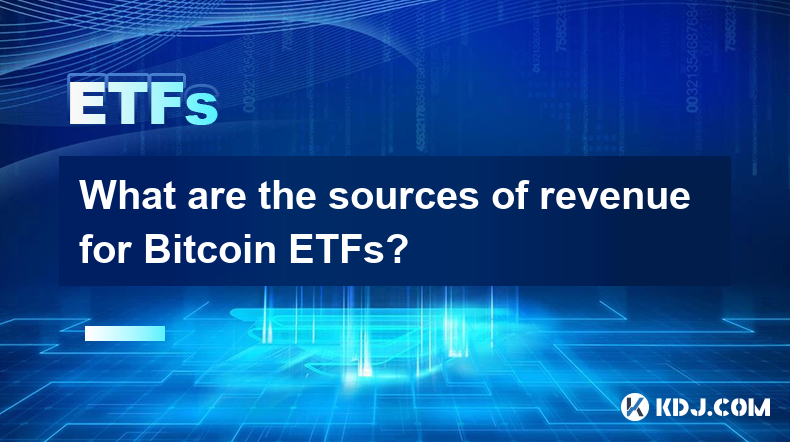
What are the sources of revenue for Bitcoin ETFs?
Feb 27,2025 at 01:30am
What are the Sources of Revenue for Bitcoin ETFs?Key Points:Bitcoin ETFs, unlike traditional ETFs, lack direct dividend payouts from underlying assets. Their revenue streams are primarily derived from management fees and, potentially, from interest earned on cash reserves.Management fees are the cornerstone of Bitcoin ETF revenue. These fees are charged...

Will Bitcoin ETF affect the difficulty of mining Bitcoin?
Feb 27,2025 at 11:24am
Will Bitcoin ETF Affect the Difficulty of Mining Bitcoin?Key Points:An approved Bitcoin ETF (Exchange-Traded Fund) is likely to increase the demand for Bitcoin, potentially driving up its price.Increased Bitcoin price doesn't directly affect the Bitcoin mining difficulty algorithm.However, a higher price can indirectly influence mining difficulty throug...

Who is the custodial bank for Bitcoin ETFs?
Feb 27,2025 at 05:12am
Who is the Custodial Bank for Bitcoin ETFs? A Deep Dive into Custody Solutions for Crypto Exchange-Traded FundsKey Points:The role of a custodial bank in a Bitcoin ETF is crucial for ensuring the security and integrity of the underlying Bitcoin assets. They act as a trusted intermediary, safeguarding the Bitcoin held on behalf of ETF investors.Several f...

Will Bitcoin ETFs affect Bitcoin’s on-chain transaction volume?
Feb 27,2025 at 02:24am
Will Bitcoin ETFs Affect Bitcoin’s On-Chain Transaction Volume?Key Points:The approval of Bitcoin ETFs could significantly increase institutional investment in Bitcoin, potentially leading to higher on-chain transaction volume. This is because institutional investors often utilize on-chain transactions for various purposes, unlike retail investors who m...

What is the redemption mechanism of Bitcoin ETF?
Feb 27,2025 at 04:06am
What is the Redemption Mechanism of a Bitcoin ETF? A Deep DiveKey Points:Understanding the Structure of a Bitcoin ETF: Bitcoin ETFs, unlike traditional ETFs, face unique challenges due to the inherent nature of Bitcoin as a decentralized, non-custodial asset. The redemption mechanism must address the complexities of physically acquiring and holding Bitc...

What is the holding structure of Bitcoin ETFs?
Feb 26,2025 at 07:42pm
What is the Holding Structure of Bitcoin ETFs?Key Points:Bitcoin ETFs, unlike traditional ETFs, hold Bitcoin indirectly through various mechanisms. Direct ownership of Bitcoin is often impractical due to regulatory hurdles and operational complexities.The precise holding structure varies significantly depending on the ETF's investment strategy, the juri...

What are the sources of revenue for Bitcoin ETFs?
Feb 27,2025 at 01:30am
What are the Sources of Revenue for Bitcoin ETFs?Key Points:Bitcoin ETFs, unlike traditional ETFs, lack direct dividend payouts from underlying assets. Their revenue streams are primarily derived from management fees and, potentially, from interest earned on cash reserves.Management fees are the cornerstone of Bitcoin ETF revenue. These fees are charged...
See all articles

















































































